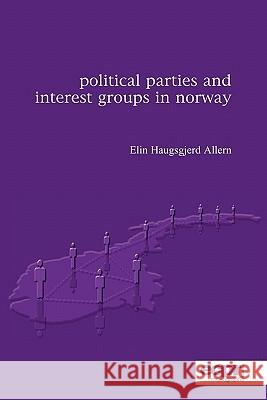Political Parties and Interest Groups in Norway » książka
Political Parties and Interest Groups in Norway
ISBN-13: 9780955820366 / Angielski / Miękka / 2010 / 390 str.
How do today's political parties relate to other organisations? Do they prefer rather distant relationships with a wide range of interest groups - or have they virtually detached themselves from civil society altogether? Scholars seem to agree that traditionally close relationships - such as those between social democratic parties and trade unions - have grown weaker since the 1960s. But to date only limited systematic research has been conducted. While parties and interest groups attract a great deal of attention from political scientists, the links between them have been largely overlooked. This book is an attempt to bridge the gap, starting from the party side of the relationship. It throws new light on the topic by presenting a theory-driven, comprehensive study of Norway's seven major political parties and their relationships with interest groups at the beginning of the new millennium. Based on original and extensive data, including party documents, in-depth interviews with key players and a survey of national party elites, Elin Haugsgjerd Allern paints a nuanced picture of the nature and significance of these relationships and the factors that shape them. A major conclusion is that Norway's parties tend to maintain rather distant but wide-ranging relationships with interest groups today. However, some parties still have fairly strong links with their traditional associates and a narrower network of links with other groups. Hence, Allern also shows that significant differences exist between parties that are apparently exposed to the same social, political and institutional environment.
Do todays political parties prefer fairly distant relationships with various kinds of interest groups - or do they virtually detach themselves from civil society altogether? These are common questions explored in studies of established democracies, and scholars widely agree that traditionally close relationships - like those between social democratic parties and trade unions - have grown weaker in many instances. However, to date, only limited systematic research has been conducted on such political links, whether within or across countries. Whilst studies of parties and interest groups separately represent highways of research, the relations between them have been largely overlooked by political scientists. This book represents one attempt to bridge the gap, starting from the party side of the relationship. It throws new light on the topic by presenting a theory-driven, comprehensive study of Norways seven major political parties and their relationships with interest groups at the beginning of the new millennium. Based on an original and extensive data material, including party documents, in-depth interviews with key informants and a survey among the entire population of national party elites, Elin Haugsgjerd Allern paints a nuanced picture of the nature, political significance, and possible shaping factors of these relationships. A major conclusion is that Norways parties tend towards a pattern of not very close and quite wide-ranging relationships with interest groups today. Great distance or virtual separation from the associational life does not characterise Norwegian parties in general. Moreover, the study reveals that some of these parties still have fairly strong links with their traditional associate and that the range of the total network of links is in some cases rather limited. Hence, Allerns book also shows that significant differences exist between parties exposed to the same social, political and institutional environment. ELIN HAUGSGJERD ALLERN is postdoctoral fellow of political science at the University of Oslo, Norway. Previously she was senior research fellow at the Institute for Social Research, Oslo. Her research interests include party organizations, the relationship between parties and interest groups and political parties and multi-level government. Allerns doctoral thesis was short-listed for ECPRs Jean Blondel PhD Prize 2008. Her work has appeared in several journals and edited volumes, including Acta Politica, European Journal of Political Research, West European Politics and Political Parties and Democracy: Europe (second volume in a five-volume set, ed. Kay Lawson, Praeger Publishers, 2010).











